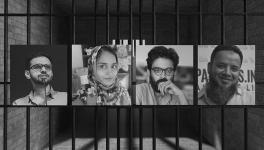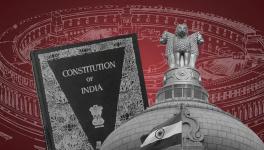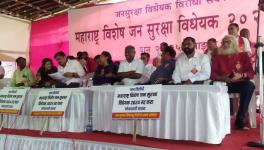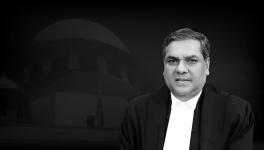The Courage of Gulfisha Fatima’s Writings
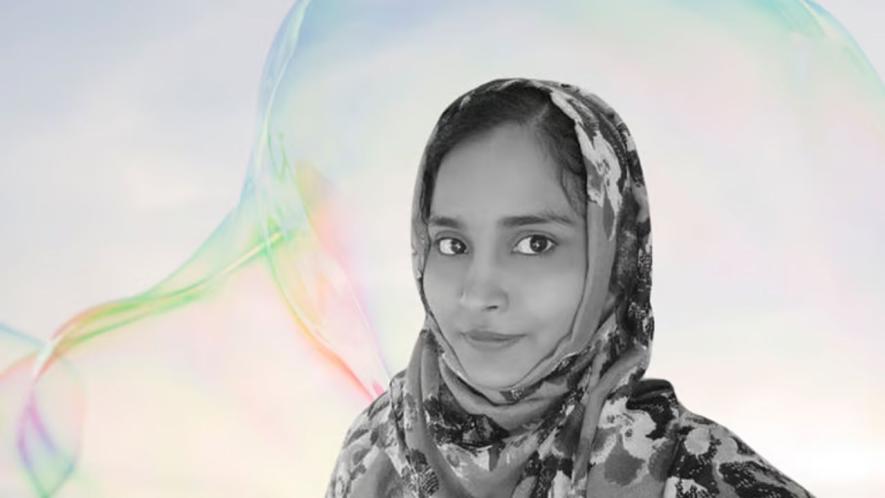
Women Prisoners embody the law’s hallucinations as these cut deep into their bodies and souls year after time in captivity. Gulfisha Fatima defies these hallucinations of the law through her verses, by providing a language to capture the suffering inflicted on pre-trial prisoners, as they wait for their trials to begin and languish in prisons for years. Now in prison for five years, as the bail hearings in the Delhi High Court continue unfold over three years, Gulfisha’s extraordinarily powerful poetry beckons us to bear witness as also to imbibe her courage. Gulfisha gives each one of us courage to speak truth to power.
She writes searingly about the deep ethical loneliness in the long night of imprisonment when the pain in her heart just does not stop, not once: Dil hai Ki Dukhta Hi Chala Jata Hai. The prisoner poet finds courage in the hope that ‘perhaps (I) might reach home, before the light of the lamp (diya) goes out’.
Poetry in captivity insistently reminds law of its lost quest for humanity. Doing time in prison, waiting for a trial, is arbitrary. It dissolves, it divides, it captures, it seeks to destroy the self.
In prison it feels like she has to climb time and ‘days become like a ladder’ . In her poem titled ‘Forgetting’, Gulfisha describes the force of law in these words by recalling how she would learn everything by heart for the history exam but she would forget the dates. And now, she writes ‘I forget now almost everything but remember only the dates.’ For biography and history disappears in face of court dates and numbers of hearings. The court dates inscribe themselves, forcing forgetting, reducing human beings to files and dates. Surely, endless and devastating custodial waiting is one of the most cruel forms of pre-trial punishment.
Doing time in prison, waiting for a trial, is arbitrary. It dissolves, it divides, it captures, it seeks to destroy the self.
Incarcerated for fighting for democracy, civil liberties and inclusive politics, the poetry of political prisoners provides us the language for understanding the injustice of pre-trial detention. Poets often do what law reformers cannot. And poets speak to each other through histories of incarceration, separated through times and jurisdictions.
In one of her poems, Gulfisha Fatima asks Faiz – what the difference between their experiences of waiting in prison might be? She answers, the difference is not history or jurisdiction but the appointed divine time, ‘waqt-e-mu'ayyan’? She confides in Faiz, ‘The silent clouds too have nothing to say, When I ask them, “how many seasons like this?”, “how many seasons like this?”’
The weight of each court date in a bail hearing is a calendar of enhancing seasons of incarceration that deepen the maddening yearning for seasons of life and liberty. As time passes, the existential truth of the appointed divine time becomes the only difference between political prisoners enjoined through different histories of state repression. Today, it is from Gulfisha’s writings that we find the courage to demand that law’s quest towards humanity be restored, conserved and expanded. This means demanding that extraordinary laws, such as the UAPA, which breed impunity, must be subject to stricter constitutional standards and safeguards, for it incorporates persecution as law’s policy, both as a doctrine and practice, under the sign of security.
The devastating impact of judicial custody on women is well documented. Yet such reports such as the Report of the National Expert Committee on Women Prisoners (1987) authored by Justice Krishna Iyer, CP Sujaya (Joint Secretary, Department of Women and Child Development), advocate Shyamalal Pappu, Sanobar Sekhar (TISS, Mumbai), L.J. Arora (Addl IG Prisons, Lucknow), Dr Suddha B Kaladate (Sociologist, Marathwada University), Kumkum Chadda (TOI) and Sheela Barse, are now mostly forgotten by courts and the public. In fact, Justice Iyer begins by reminding courts and public to “remember, undertrials languish even for years in prisons and days in police custody. In law, you are then presumed innocent, in life that is the worst laceration. The whole process is contrary to decency, dignity and humanity” (p. 41). This insistent reminder to remember, as we find in the poetry of the incarcerated, is a call to re-count the legal and cultural histories of women in prisons.
And when we encounter the introduction by Justice Krishna Iyer in this two volume report on women prisoners, we are reminded of the duty to renounce practices derogatory to women as the basis for governments, courts and citizens to ensure that women are not locked up in police stations or prisons at all. Justice Iyer recommended that other than in the rarest of rare cases, ‘women need not be arrested at all’ (emphasis in original, p 57). The Expert Committee found that in overwhelming cases women do not abscond or disregard summons for court hearings. The Committee had found scores of women in prison, in deplorable conditions, on illegal grounds – often for moral, or political reasons. For example, Justice Iyer was shocked by the imprisonment of several adult rape victims on the ground that they might be required as witnesses at a future date in trials - what he called a form of illegal ‘confessional detention’. Further, Justice Krishna Iyer insisted that if a lone woman was locked up in an all-male jail, this would amount to solitary detention.
Even in ‘exceptional cases’, the Justice Iyer Committee recommended that special reasons be recorded for arrest and remand, upon which the woman “may be given the option to go home after executing a bond of her own with a condition that she will report before a probation officer of a women’s police station” (p. 59). In case of detention, women should be allowed to meet their families with a “weekend leave system” (p. 59). This recommendation provides a jurisprudential basis for interrogating exceptional laws such as the UAPA, which put an embargo on bail, and suggest methods of ensuring that women’s personhood and dignity is preserved while they wait for their trials to be completed. Anything less than this, is derogatory to all women. For the personhood and dignity of women is an ‘inviolable’ value, and women are entitled to ‘special treatment’ as guaranteed by the constitutional order (p. 57).
Written after the Mathura Open Letter and bearing the imprint of the women’s movement, the National Expert Committee on Women Prisoners report would grieve today for having failed women undertrials.
Written after the Mathura Open Letter and bearing the imprint of the women’s movement, the National Expert Committee on Women Prisoners report would grieve today for having failed women undertrials. It would lament that our courts and legislators ignored this groundwork for a jurisprudence of what might be called an early gender specific ‘abolitionist’ perspective. The Committee would be stunned that today women who participate in social movements, especially Muslim women, farmers, activists, journalists and students, are increasingly treated as criminals, only for raising their voices as citizens – and as women.
Is this penal policy of the state not derogatory to all women? Really speaking, why must we, as citizens, tolerate the expansion and even celebration of cruel forms of pre-trial detention and masculinist carceral cultures of the state?
Pratiksha Baxi is an Indian sociologist and feminist legal scholar.
Courtesy: The Leaflet
Get the latest reports & analysis with people's perspective on Protests, movements & deep analytical videos, discussions of the current affairs in your Telegram app. Subscribe to NewsClick's Telegram channel & get Real-Time updates on stories, as they get published on our website.













